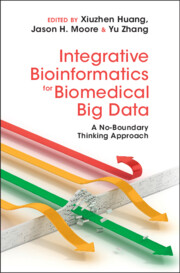Book contents
- Integrative Bioinformatics for Biomedical Big Data
- Integrative Bioinformatics for Biomedical Big Data
- Copyright page
- Dedication
- Contents
- Contributors
- 1 No-Boundary Thinking
- 2 Artificial Intelligence Approaches to No-Boundary Thinking
- 3 No-Boundary Thinking in Undergraduate Bioinformatics Education
- 4 No-Boundary Course Developments
- 5 No-Boundary Thinking for Transcriptomics and Proteomics Big Data
- 6 Pharmacogenomics
- 7 The Ethical Status of an AI
- 8 Computational Thinking and No-Boundary Thinking
- 9 Carving Nature at the Joints: Which Joints?
- Index
- References
6 - Pharmacogenomics
Published online by Cambridge University Press: 14 September 2023
- Integrative Bioinformatics for Biomedical Big Data
- Integrative Bioinformatics for Biomedical Big Data
- Copyright page
- Dedication
- Contents
- Contributors
- 1 No-Boundary Thinking
- 2 Artificial Intelligence Approaches to No-Boundary Thinking
- 3 No-Boundary Thinking in Undergraduate Bioinformatics Education
- 4 No-Boundary Course Developments
- 5 No-Boundary Thinking for Transcriptomics and Proteomics Big Data
- 6 Pharmacogenomics
- 7 The Ethical Status of an AI
- 8 Computational Thinking and No-Boundary Thinking
- 9 Carving Nature at the Joints: Which Joints?
- Index
- References
Summary
Pharmacogenomics is the study of genetic factors that influence drug response. Pharmacogenomics combines pharmacology and genomics to identify genetic predictors of variability in drug response that can be used to maximize drug efficacy while minimizing drug toxicity in order to tailor drug therapy for patients, thus improving patient care and reducing healthcare costs. In this chapter we review the field of pharmacogenomics in its current state and clinical practice. Recent research, methods, and resources for pharmacogenomics are reviewed in detail. We discuss the advantages and challenges in pharmacogenomic studies. We elaborate on the barriers to clinical translation of pharmacogenetic discoveries and the efforts of various institutions and consortia to mitigate these barriers. We also discuss applications and clinical translation of pharmacogenomic research moving forward, along with social, ethical, and economic issues that require attention. We conclude by previewing the use of big data, multi-omics data, advanced computing technology, and statistical methods by scientists across disciplinary boundaries along with the efforts of government organizations, clinicians, and patients that could lead to successful and clinically translatable pharmacogenomic discoveries, ushering in an era of precision medicine.
Keywords
- Type
- Chapter
- Information
- Integrative Bioinformatics for Biomedical Big DataA No-Boundary Thinking Approach, pp. 87 - 134Publisher: Cambridge University PressPrint publication year: 2023

